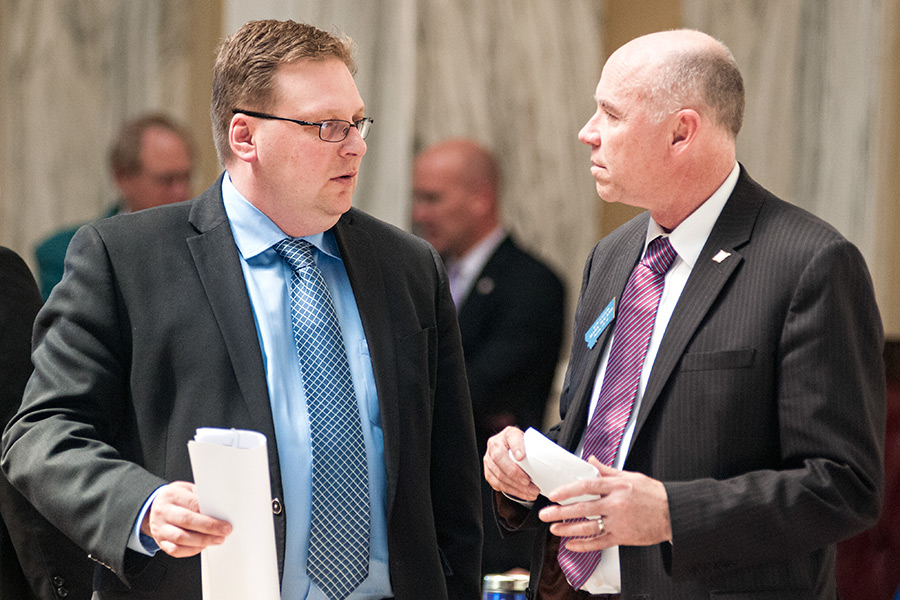Budget Breakdown
As a special session looms for the first time in a decade, no clear solution has emerged between lawmakers and the governor
By Tristan Scott
The last special legislative session in Montana was held a decade ago, when Gov. Brian Schweitzer, a Democrat, announced the “call” summoning lawmakers back to Helena in order to fund government and transfer money to pay for wildland firefighting.
Today, Schweitzer’s Democratic successor, Gov. Steve Bullock, is in an even direr situation following an expensive wildfire season and lower-than-expected revenues. To remedy the crisis and backfill a $227 million budget shortfall or spur lawmakers into action, Bullock has proposed drastic spending cuts that leave state leaders with two choices — accept the nearly 10 percent across-the-board cuts to state agencies, or convene for a special session in an effort to craft revenue-generating legislation and defray the cost-cutting.
In the event of the latter, it will be the 32nd such gathering in Montana history, while the former will result in damaging hits to nearly all state government, doing away with early childhood intervention programs, eliminating hundreds of state jobs, reducing safety-monitoring cameras at the state prison, and dicing up essential services to tens of thousands of Montana’s most vulnerable residents.
State law allows a special session to be called by the governor or through a vote by lawmakers.
But with heavy Republican opposition to permanent tax increases proposed by the governor, many legislators wonder if a special session would be in vain given that any success will hinge on bipartisan agreement.
Still, on Oct. 5, following two days of testimony from agency officials and state residents who would be hardest hit by the sweeping cuts, the Legislative Finance Committee offered the first hint that lawmakers may be willing to collaborate with the governor. In a memo, the committee expressed a willingness to consider combining budget cuts with “creative” measures in order to drum up money, like delaying general fund payments to a state health benefits program or lowering the amount of money the state is required to keep in the bank.
Bullock said the memo shows the Legislative Finance Committee recognized the proposed cuts would hurt Montanans deeply, but added: “they failed to offer any realistic solutions.”
Meanwhile, Bullock is recommending new revenue streams in the form of tax increases that could salvage services and programs that would otherwise end up on the chopping block. His proposed solutions include increasing the state tax on cigarettes, wine and medical marijuana; an increase to the state’s bed tax; and creating a new tax bracket for those with taxable incomes topping $500,000 a year to promote tax equity.
But tax increases are unpopular with many GOP lawmakers in the Republican-controlled House and Senate, including some of those in the Flathead, and so far the governor’s calls for permanent tax increases have been rebuffed.
The hardest-hit agencies under the 10 percent reduction plan are the state Department of Public Health and Human Services, the Department of Corrections and the Office of the Commissioner of Higher Education. Combined, the three agencies would endure 85 percent of the cuts.
Bullock asked DPHHS to find ways to trim $105 million in spending over the next two years, including in senior and long-term care, child protection services and addictive and mental disorder programs.
Dan Villa, Bullock’s budget director, said the Montana Legislature’s sole constitutional responsibility is to provide a balanced budget, and the proposed cuts comply with state law.
“But they are horrendous options,” he said. “They are awful. There is a better way out and it will be up to this committee as well as the governor’s office to figure that out.”
Kalispell Republican Mark Blasdel characterized the final biennial budget as an improvement over the “house-of-cards” proposal that initially came from the governor’s office, which he said had been built on the assumption that a range of new or increased taxes would pass, including those on alcohol and cigarettes.
“The budget was built on the false assumption that a lot of tax policies and tax increases were going to pass,” he said. “That’s never a safe assumption.”
Blasdel was among the lawmakers in the Republican-controlled House and Senate who successfully resisted proposals to place taxes on tobacco products and raise income taxes on the state’s highest earners.
Republican Mark Noland, of Bigfork, served as chair of the House Business and Labor Committee and said the Legislature did its job and now it’s time for the governor to do his. He also rejected the notion that, in the event that a special session isn’t convened or isn’t successful, that the blood would be on the GOP’s hands.
“We passed a conservative budget, a budget that fully funded the Department of Health and Human Services at the requested level, I should add, because we felt that was very important,” he said.
The cost of a special session totals $106,794 on the first day, with a price tag of $58,547 each day after, according to the Legislative Services Decision.
There is no deadline for the governor to make a decision about the cuts, but $120 million in payments to schools were due in late November and would impact the budget.